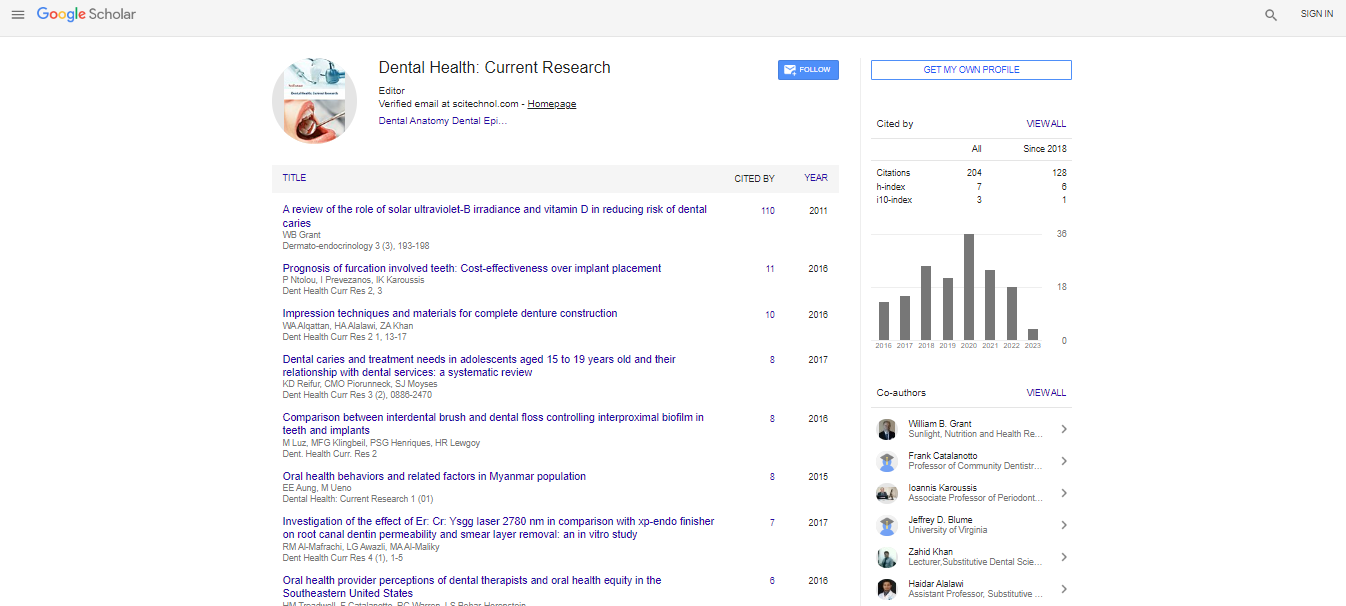Commentary, Dent Health Curr Res Vol: 9 Issue: 4
The Connection between Diet and Dental Health: Dietary Guidelines for a Healthy Smile
Aiswarya Thilakarathne*
1Department of Community Dental Health, University of Peradeniya, Peradeniya, Sri Lanka
*Corresponding Author: Aiswarya Thilakarathne,
Department of Community
Dental Health, University of Peradeniya, Peradeniya, Sri Lanka
E-mail: ais12@dental.pdn.ac.lk
Received date: 01 August, 2023, Manuscript No. DHCR-23-113081;
Editor assigned date: 03 August, 2023, PreQC No. DHCR-23-113081 (PQ);
Reviewed date: 17 August, QC No. DHCR-23-113081;
Revised date: 24 August, 2023, Manuscript No. DHCR-23-113081 (R);
Published date: 31 August, 2023, DOI: 10.4172/2470-0886.1000170
Citation: Thilakarathne A (2023) The Connection between Diet and Dental Health: Dietary Guidelines for a Healthy Smile. Dent Health Curr Res 9:4.
Description
When someone think about maintaining good oral health, they often focus on brushing, flossing, and regular dental check-ups. While these practices are undoubtedly important, the role of our diet in promoting healthy teeth and gums should not be underestimated. The foods intake have a direct impact on our dental health, influencing the strength of our teeth, the health of our gums, and even our susceptibility to cavities and gum disease.
The nutritional building blocks of dental health
Our teeth and gums require specific nutrients to stay strong and resilient. These nutrients play vital roles in maintaining the structural integrity of teeth, protecting against decay, and promoting overall oral health. Let's explore some of the key nutritional components that contribute to a healthy smile-
Calcium and phosphorus: Calcium is well-known for its role in building strong bones, but it's equally important for dental health. Teeth are primarily made of calcium, and adequate calcium intake supports enamel strength, which acts as a shield against decay. Phosphorus, often found in conjunction with calcium, further enhances the mineral density of teeth.
Vitamin D: Vitamin D is essential for the absorption of calcium from the foods. It aids in the maintenance of optimal calcium levels in the body, supporting the formation and maintenance of strong teeth and bones. Adequate vitamin D levels are especially important for individuals who may not get sufficient sun exposure.
Vitamin C: This vitamin is essential for maintaining healthy gums and promoting the healing of oral tissues. It supports collagen production, which contributes to the strength and integrity of gum tissues. Vitamin C also plays a role in immune function, helping to protect against infections and inflammation in the oral cavity.
Fiber: Fiber-rich foods, particularly fruits and vegetables, stimulate saliva production and aid in oral hygiene. Chewing fibrous foods helps clean the surfaces of teeth, and increased saliva production helps neutralize acids and rinse away food particles, reducing the risk of cavities.
Water: Staying hydrated is important for overall health, but it's also essential for maintaining good oral health. Drinking water helps wash away food particles, promote saliva production, and maintain the ideal moisture balance in the mouth.
Dietary guidelines for a healthy smile
Let’s discuss the nutritional components that contribute to dental health, let's outline practical dietary guidelines for promoting a radiant smile-
Embrace calcium-rich foods: Incorporate dairy products such as milk, yogurt, and cheese into the diet. Lactose intolerants or following a plant-based diet, opt for fortified plant-based milk alternatives. Additionally, include leafy greens like kale, spinach, and collard greens, as they are excellent sources of calcium.
Load up on fruits and vegetables: Choose a variety of colourful fruits and vegetables to provide essential vitamins and fiber. Apples, pears, carrots, and celery are particularly beneficial due to their fibrous texture, which helps clean teeth.
Consume lean proteins: Incorporate lean proteins like chicken, turkey, and lean cuts of meat intake in diet. These proteins contain phosphorus, which supports tooth structure and health.
Include nuts and seeds: Snack on nuts and seeds like almonds, walnuts, and sunflower seeds. These nutrient-packed foods provide essential minerals and healthy fats that benefit both dental health and overall well-being.
Limit sugary and acidic foods: Reduce the consumption of sugary and acidic foods, as they can contribute to tooth decay and enamel erosion. When indulging in these treats, do so in moderation, and consider rinsing mouth with water afterward.
Stay hydrated: Drink plenty of water throughout the day to keep mouth moist and aid in the removal of food particles. Water also helps maintain a neutral pH in the mouth, preventing the growth of harmful bacteria.
Practice good oral hygiene: While a balanced diet is essential, it's important to remember that diet works in conjunction with proper oral hygiene practices. Brushing of teeth twice a day, floss daily, and use an antimicrobial mouthwash to maintain a clean mouth and free from harmful bacteria.
Conclusion
The connection between diet and dental health is undeniable. By nourishing body with the right nutrients, one can support strong teeth, healthy gums, and a beautiful smile. Remember to include calciumrich foods, prioritize vitamin D sources, enjoy a variety of fruits and vegetables, and be mindful of sugary and acidic treats. These dietary guidelines and maintaining excellent oral hygiene practices are significant steps toward achieving and maintaining optimal dental health for years to come.
 Spanish
Spanish  Chinese
Chinese  Russian
Russian  German
German  French
French  Japanese
Japanese  Portuguese
Portuguese  Hindi
Hindi 